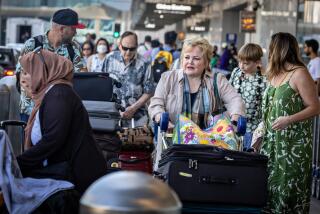Airlines get slightly higher marks from passengers
- Share via
The faces of passengers at airports may not always show it, but satisfaction with airline service is on the rise, according to a new survey.
But the 2011 North American Airline Satisfaction Study by J.D. Power & Associates was not all good news for the airline industry: Passengers remain unhappy about rising airfares and fees, particularly those charged by the major carriers.
Overall satisfaction with airlines in 2011 improved to an average of 682 on a 1,000-point scale, up 10 points from 2010, according to the survey of more than 13,500 passengers who said they flew on a major North American airline between July 2010 and April 2011.
But when it comes to airfares and fees — such as those for checking bags, changing reservations or requesting a snack — passengers gave most airlines low marks. The survey showed that satisfaction with the airfares and fees of large airlines fell to 555 in 2011 from 582 last year.
For the six straight year, JetBlue Airways had the highest overall satisfaction rating among low-cost airlines. One reason offered by the survey: JetBlue’s in-flight service. The New York carrier charges nothing for the first checked bag and offers unlimited complimentary snacks and drinks and 36 channels of free television and 100 channels of free satellite radio.
• Soldiers’ complaints get Delta’s attention
Among U.S. soldiers, the satisfaction level with Delta Air Lines may have been pretty low last week after a group of warriors returning from Afghanistan posted an online video complaining that they were charged to bring a fourth piece of baggage on a Delta flight.
Two Army staff sergeants shown on the video said Delta charged them $200 each to check a fourth bag, totaling $2,800 for an entire unit of returning soldiers.
Like many other airlines, Delta has a contract with the U.S. military to transport soldiers who are traveling on military orders. They can check up to three bags for free if they are traveling in economy seats or four bags if they travel in first or business class.
Once the video was posted online, Delta changed its policy on checked bags. It will now allow soldiers and their dependents to check up to four bags for free in the economy section or five bags when they fly first or business class.
“We hope these changes to our policies reflect the true respect we hold for our service men and women,” Delta posted in an online blog last week.
Delta also offered to reimburse the soldiers’ fees if the government failed to do so.
Soon after Delta changed its policy, a wave of patriotism swept through the airline industry. American Airlines, United Air Lines and Continental Airlines also said they would increase the number of free bags soldiers can check when flying on orders.
• Airlines outline their vision for passenger screening
In the airport checkpoint of the future, travelers may breeze past sensors that can detect metal, explosives and liquids, eliminating the need to take off shoes and belts or unpack carry-on luggage.
At least that was the vision unveiled last week by the International Air Transport Assn., the trade group for the world’s airlines. The association is promoting the idea that passengers who pose the highest risk should undergo the most stringent screening.
Under the plan, passengers would be directed into one of three security lanes: “known traveler,” “normal,” and “enhanced security.” Passengers moving through the “known traveler” lane would get the least rigorous screening, while the passengers directed into the “enhanced security” lane would get the most.
For years, the federal government has sought to treat everyone in the security lines equally, but under the industry plan the government would choose which lane is for you.
The government would conduct a risk assessment” before you get to the airport, based on background information. A “biometric identifier” in your passport or identification document would tell airport screeners how much screening you need.
IATA Director General Giovanni Bisignani said the idea is to stop looking for bad objects and instead look for bad people.
But when a video of the plan appeared on YouTube last week, most comments were highly critical.
“This is just another step down the road to tyranny and we are being trained like slaves to accept it,” one said.
Said another: “Next, they will be implanting us with? some GPS tracker.…geez!”
More to Read
Inside the business of entertainment
The Wide Shot brings you news, analysis and insights on everything from streaming wars to production — and what it all means for the future.
You may occasionally receive promotional content from the Los Angeles Times.










